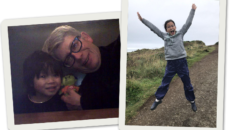Three years ago, I stepped joyfully onto the roller coaster of reunion with the son I had relinquished for adoption 26 years before. Little did I know what an emotionally intense and unsettling ride it would become.
I was 19 when I got pregnant — certainly old enough to take on the responsibility of a child. But without independent means, a husband or family support, the only acceptable course of action was to relinquish my child to a deserving couple who would provide the stability and opportunities that I could not. Unlike the open adoptions of today, birth mothers from my era were shrouded in secrecy. No one ever need know, we were told. Our families would be spared the shame of our mistakes. We would forget and move on. Our babies would be better off, and eventually we would have other children, ones we could keep. Scared and hopeless, I did what I believed I had to do.
Holding onto a Dream
Even though I didn’t actively search for my son, I held tight to the dream that someday I would see him again. Every so often, I’d go through the motions of looking for him — gathering paperwork, looking in old phone books — but in the end, I was too frightened that he’d be angry, that he’d hate me, that I had no right. Still, I felt like I had to do something, and on his eighteenth birthday, I sent my information to International Soundex Reunion Registry (ISRR), the nonprofit, mutual-consent database in Las Vegas, Nevada. Then I just waited, fantasizing about him showing up at my door, and brooding as the years went by and it hadn’t happened.
At that point, I had never even met another birth mother. For all I knew, I might have been the only one on the planet! TV movies, talk shows and Dear Abby columns were the extent of my education on adoption and reunion. I had never read a single book on the subject. Even though I had shared my secret with my husband and a few close friends, I had never voiced my deepest feelings.
So, when I got the call from Soundex eight years later that they’d matched me with my son, Joshua, I thought, at long last, everything was okay. We talked, we laughed, we met, we cried. We loved each other completely. That’s all there was to it, right? Let the happily-ever-after begin!
Painful Realities Surface
We were about a year into our reunion when the glow began to fade and the painful realities began to surface. My son’s early life hadn’t been the ideal I had imagined, and the more I knew of him, the more I saw how troubled he was. Josh had been estranged from his adoptive family for some time, an early marriage had ended badly, and now his second was falling apart. He’d left a battlefield of broken relationships in his wake, and I had the horrible feeling that I was next. In my frustration, I began reliving the circumstances of my pregnancy, Josh’s birth and relinquishment, obsessing over the details and playing out happier scenarios in my mind. Having repressed the grief of losing him in the first place, I was ill-prepared for the avalanche of emotions coming down upon me now.
Confused and overwhelmed, I turned it all inward. Even though I had lots of loving support from my husband and friends, I found it difficult to talk openly with them, to express feelings that even I didn’t understand or let them know how close to collapsing I really was. Where, at first, I had considered myself lucky that his adoptive parents were no longer involved — that he was finally “all mine” — I realized how much I would have liked to meet them and learn from their insight. The roller coaster was plummeting toward the ground, and I wondered if I could hang on.
I was at my lowest point when, simply by chance, I learned that there were a number of books on reunion, organizations that offered support groups, and therapists who specialized in adoption issues. I began reading everything I could get my hands on, and discovered that hundreds of other birth mothers had expressed many of the same feelings and had similar problems in their own reunions. Through PACER (the Post Adoption Center for Education and Research, located in California), I found a support group for birth mothers and, from the first meeting, was stunned by the sense of connection that I felt. We were of all ages and from many different backgrounds, yet we had this one tremendous, life-altering experience in common. Even though the details varied, just hearing what others had been through and how they had dealt with it made all the difference in the world.
Learning from Others
Later on, when I participated in triad support groups, which also included adoptees and adoptive parents, I learned that the rough ride is not confined to birth parents. I met adoptees who had struggled their whole lives with who they were, where they came from, why they had been given up. Some felt guilty for wanting to search; others, even after years in reunion, had not yet told their adoptive parents. Many kept their birth parents at arm’s length, still fearing rejection. Others, like my son, were needy and longed for the mother whose love they had imagined would make their lives right. For some it was too late, finding that their birth mother or birth father, or both, had already passed away.
I met adoptive parents who were terrified of losing their grown children to the birth parents, that they would be replaced or less loved. Some felt betrayed that their child had searched after all they had provided, and many had a difficult time during the initial stages of reunion, when their son or daughter seemed so intensely focused on this new relationship. Others saw such positive changes in their adoptive children that they could not help but open their hearts and lives to the birth parents. Whatever the circumstances, I witnessed every member of the triad learning from one another, gaining a deeper understanding and a true sense of connection.
Through a combination of education and support, I finally made my way back to a place where I can cope. Of course, the roller coaster ride is far from over. Josh and I have lots of work and lots of healing left to do, as we continue to carve out a mutually-rewarding relationship. There will continue to be rough times, mistakes made, hurts and disappointments, as well as good times and victories. But now the ups and downs no longer seem so life-threatening.
Reunion is both a joy and a challenge. Most of all, it’s a process. Knowing what I do now, I wish that I had prepared myself, instead of letting my fantasies and fears run the show. Having taken the path I did, I would encourage others — birth parents, adoptees and adoptive parents alike, whether just beginning their search or already involved in reunion — to read and learn, attend support groups, and hear from others who have been there. There’s no reason to ride the roller coaster alone. Help is out there!



